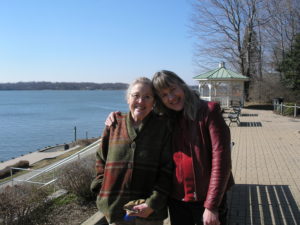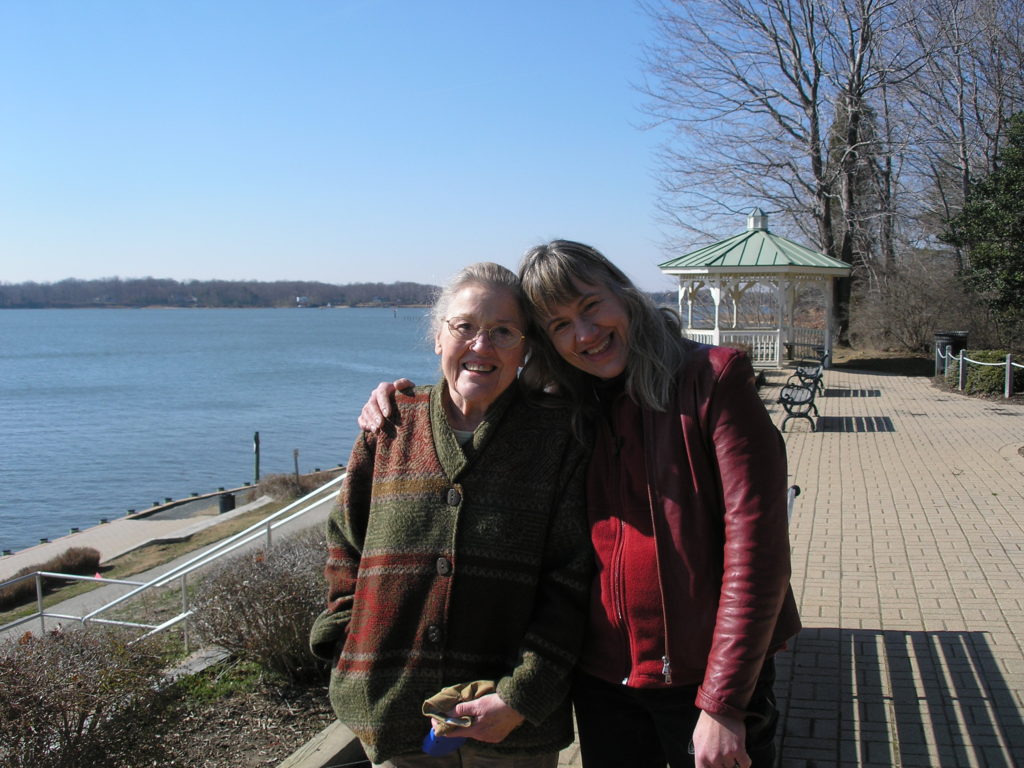
Yesterday afternoon, as I was weeding the strawberries, I got a call from my only remaining mother. Her name is Toni, one of the very few women in the universe with my name. I got it from her. She had thought it would be a faint thumbprint on my forehead, to inevitably be washed away by the flood of love from new parents when they adopted me. It stuck, maybe from a sense of gratitude, maybe compassion, maybe unknowing, but my new mother recognized it as my name.
It was right about this time thirty years ago that I met her. My birth father had made the voyage out from upstate New York to Vancouver, Washington, a few weeks before. He had wanted to give her some time to absorb the impact through him. He had wrapped us in his large warmth and generosity, sealing the bonds all around, and had gone back to move forward with a life that included five children now instead of four and four grandchildren instead of two and to weave us into his life with Toni, his wife.
The anticipation of her arrival was immense. When I was a child, I had looked at my mother knowing that, unlike other children, I had not come from inside her body. A sense of vertigo would overwhelm me, like Alice falling down the yawning hole. I had sung to this first mother, connecting to her love though the sound of my voice, wandering out in search of her.
Preparing now for her coming, the house was as immaculate as I could make it. There was a basket of primroses on the table. In addition to being a history professor, I knew she was a master gardener, so the garden was weeded. I had gotten a haircut for the event and the kids were all bathed and brushed. We went to the airport early, I with my new camera in hand. As we waited, I sat with my eighteen-month-old son on my lap in one of those molded plastic airport chairs of indeterminate brown, watching the sky and the clouds drifting by over the waiting airplanes. I stood up, thinking I saw her plane taxiing into the gate.
As I turned back to gather my coat, I watched in a frozen moment as my son held my camera over the stairwell behind his seat and let go of it. An infinite moment later–the slight crunch. There are no family photos of my first mother’s arrival, of her first hugs, of the grace of her movement and the laughter, of standing next to each other to compare our heights, of looking for the similarities of eye color, chin, hair—of sweeping up her things and swirling to the car in a kind of awkward dance in which feet seemed to have difficulty making contact with floor and sidewalk.
The next scene is at the house where I sat across from her at the wooden kitchen table with a glass of white wine. As we talked in rushes, full of questions, we looked at other furtively yet greedily, periodically lowering our eyes as if to shield from too much sun. Her speech was so familiar, yet new, like some perfected, more patrician version of my own.
As I watched her talk, I felt an uncanny sensation of familiarity that one sometimes has when seeing the face of your child or your spouse after a time of separation, and then the dizzying sensation of looking into a glass. As if watching myself in a shop window, seeing only some of the image but catching the reflected movement, I saw she moved her hands when she talked just as I did, with the same expansive gesture and the same gaze. Later, as we sat in the living room, I watched her sitting close to my son and daughter, with her arm draped over the back of the sofa. In the way that arm found its comfort was the incontrovertible evidence of the ineffably subtle information passed on in the DNA. Her turn of phrase, her love of language, the music of her movement all emerged from the same place deep within those twists of adenine, guanine, thymine and cytosine. Somehow those things had persisted even through the immense force of the ocean of experiences that had shaped us.
As we stood in the kitchen, cleaning up after dinner, kids underfoot, she said,
“This sounds really odd, but do you mind if I smell the top of your head? When each child was born, I smelled their heads and each time the fragrance was so deeply familiar, so sweet. It was such a treasure. My grandchildren had the same smell. I would recognize it anywhere. Let me see if you still have that fragrance, even faintly.”
As I bent down to let her take in the smell, something passed between us. She said,
“Ah yes! That’s it.”
And then,
“Do you know, ever since you were born I’ve felt something connected us like an umbilical cord of energy that extends from somewhere around my solar plexus to that same point in you. I remember being struck that Jane Eyre spoke of the same kind of channel. She described it as a cord of connection that began from somewhere under her left rib and tied to a place in Rochester.”
We stood for a moment, feeling the warmth in that place where the ribs come together, over the heart.
“Yes. I know it,” I said.
I have never dared to speak of the next part of this passage in which she expresses the fear of the bleeding within that would happen if he were to leave her. And then the terrible abandonment of his eventual forgetting. It was not just I who was abandoned.
It had become a forbidden love for her, I thought.
Now, after we have churned through all the years of initial joys and family complications and my birth father has died, we speak as friends who are still somehow a bit shy of the deep connection, who know where the hurts lie. We skirt around them, delicately, sharing our passions for politics (just to the edge of divergence), gardens, and most important, family, still connected by a vibrating cord of energy, fueled perhaps by those nucleotides of DNA and the empathy they have lent to all the movements of life that have worked to pull us apart.


I love reading your posts, Toni. I hear your voice in each one. Thank you for sharing these stories.